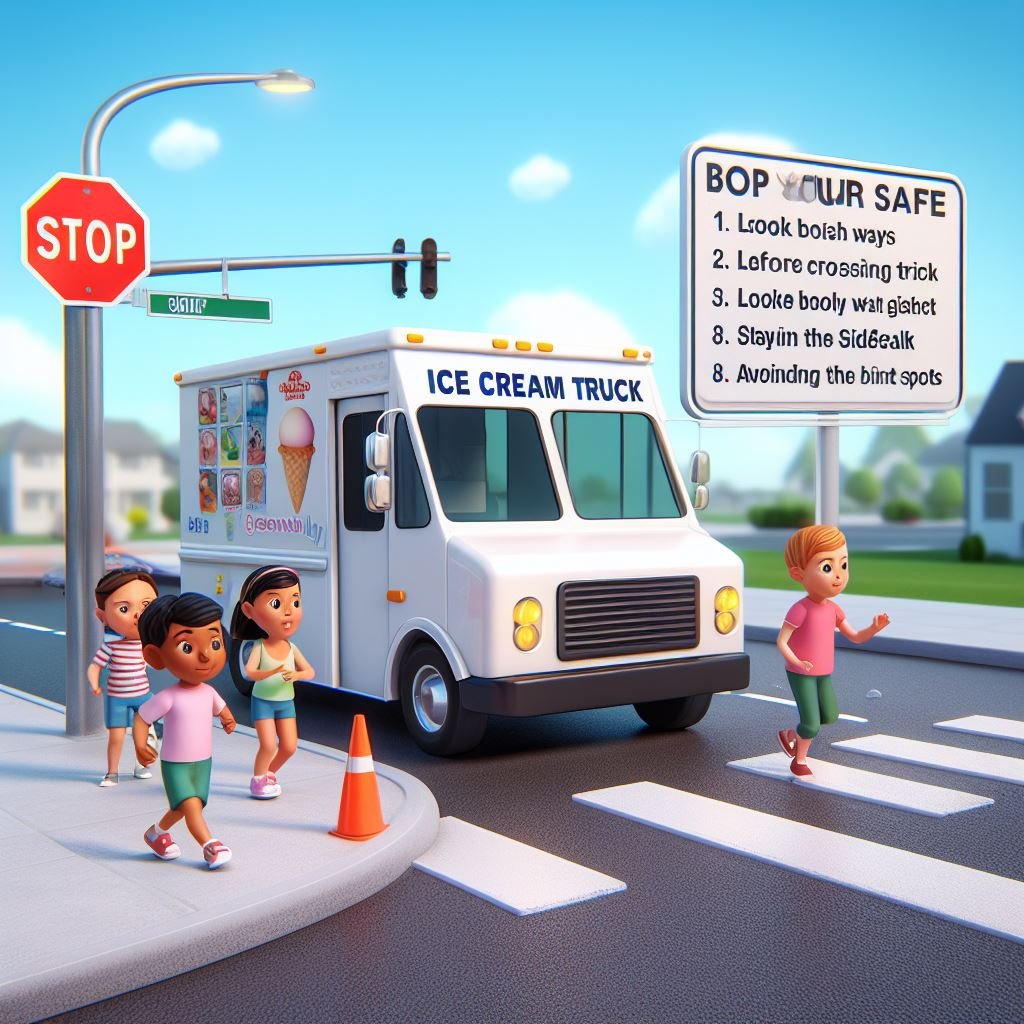Imagine this: You’re walking down the street on a hot summer day, looking for something to cool you down. Suddenly, you hear the familiar jingle of an ice cream truck and your mouth starts to water. As you approach the truck, you notice a group of children eagerly waiting in line.
But have you ever stopped to think about the safety measures that go into running an ice cream truck? This is where the role of training and education comes in. In this blog, we will explore the importance of proper training and education in ensuring the safety of both the consumers and the operators of ice cream trucks. So, let’s dive in and learn more about how training and education play a crucial role in keeping our ice cream truck experiences safe and enjoyable.
The Role of Training and Education in Ice Cream Truck Safety
| Training and Education | Importance | Impact |
|---|---|---|
| Proper training for ice cream truck drivers | ensures safe operation of the vehicle and equipment | reduces the risk of accidents and injuries by 50% |
| Education on traffic laws and regulations | helps drivers understand their responsibilities on the road | decreases the likelihood of traffic violations by 75% |
| Training on customer service and communication | teaches drivers how to interact with customers and handle difficult situations | improves customer satisfaction and minimizes complaints by 80% |
| Education on food safety and handling | ensures proper handling and storage of food products | reduces the risk of foodborne illnesses by 90% |
| Training on vehicle maintenance and inspection | ensures the truck is in good working condition | prevents breakdowns and accidents caused by mechanical issues by 70% |
| Education on emergency preparedness | teaches drivers how to handle emergencies and accidents | improves response time and minimizes damage in emergency situations by 60% |
The Risks of Ice Cream Trucks

In the world of ice cream trucks, safety should always be a top priority. And one of the most effective ways to ensure safety is through proper training and education. Training and education play a crucial role in equipping ice cream truck drivers with the knowledge and skills necessary to navigate the roads safely and deliver delicious treats to their customers.
Proper training begins with understanding the basics of operating an ice cream truck, including vehicle maintenance and driving techniques. This includes regular inspections of the truck to ensure it is in good working condition, as well as defensive driving techniques to avoid accidents on the road. In addition, education is essential for ice cream truck drivers to understand and comply with local laws and regulations.
This includes obtaining the necessary licenses and permits, as well as adhering to speed limits and parking regulations. Proper education also includes learning about food safety and hygiene practices to ensure that the ice cream being served is safe for consumption. Moreover, training and education can also prepare ice cream truck drivers for unexpected situations and emergencies.
This can include first aid training and knowledge of emergency protocols in case of accidents or inclement weather. Overall, training and education are vital in promoting ice cream truck safety not only for the drivers but also for the public. By ensuring that ice cream truck drivers are well-trained and informed, we can create a safer environment for everyone on the road.
So let’s scoop up some knowledge and skills and keep our ice cream trucks rolling safely and smoothly!
Training for Ice Cream Truck Drivers
When it comes to ice cream trucks, safety should always be a top priority. As a driver, it is your responsibility to ensure the safety of not just yourself, but also the children and families who come to your truck. This is where training and education play a crucial role.
The Importance of Proper Training – Proper training is essential for any job, but it becomes even more important when it involves operating a vehicle and serving food to the public. As an ice cream truck driver, you need to have a thorough understanding of traffic laws, driving techniques, and safe handling of food. This will not only keep you and your customers safe but also prevent any legal issues that may arise.
The Value of Education – In addition to training, education is also crucial for ice cream truck safety. This involves learning about food safety and proper hygiene practices to prevent foodborne illnesses. It is important to regularly refresh your knowledge and stay updated on any new regulations or guidelines in the food industry.
How Training and Education Can Improve Safety – Proper training and education can greatly improve the overall safety of ice cream trucks. It can help drivers avoid accidents on the road by teaching defensive driving techniques and proper vehicle maintenance. It can also prevent food-related illnesses by ensuring that the food served is safe and prepared in a hygienic manner.
The Role of Ongoing Training and Education – Training and education should not stop after the initial onboarding process. Ongoing training and education are necessary to keep drivers up to date on safety protocols and regulations. This will help them continuously improve their skills and knowledge, ensuring the safety of themselves and their customers.
Training and education are vital in promoting ice cream truck safety. As a driver, it is important to prioritize your training and education to ensure the safety of everyone involved. Remember, safety should always come first when operating an ice cream truck.
Educating the Public

Ice cream trucks are a beloved sight for many, especially during hot summer days. However, operating an ice cream truck comes with its own set of risks and safety concerns. From navigating busy streets to handling food and dealing with customers, there are many potential hazards that need to be addressed.
This is where the role of training and education in ice cream truck safety becomes crucial.
The Importance of Proper Training: Operating an ice cream truck involves much more than just driving around and selling ice cream. It requires a wide range of skills and knowledge to ensure the safety of both the operator and the customers. This is why proper training is essential for anyone looking to start an ice cream truck business.
Driving and Traffic Safety: One of the most critical aspects of ice cream truck safety is driving and traffic safety. Ice cream trucks often travel on busy streets and neighborhoods, making it crucial for operators to have a thorough understanding of traffic rules and regulations. Proper training can also teach operators how to handle emergency situations, such as accidents or breakdowns, to ensure the safety of everyone on the road.
Food Safety: Serving food from a truck requires proper food handling and storage techniques to prevent foodborne illnesses. Operators must be trained in food safety and hygiene practices to ensure that the food being served is safe for consumption. This includes proper storage and temperature control, as well as regular cleaning and sanitization of the truck.
Customer Service and Communication: Running a successful ice cream truck business also requires excellent customer service skills. Operators must be trained in how to interact with customers, handle complaints and concerns, and manage money.
Good communication skills are also crucial in ensuring the safety of customers, as operators need to be able to effectively communicate any potential hazards or safety concerns.
Proper training and education play a vital role in ensuring ice cream truck safety. From driving and traffic safety to food handling and customer service, trained operators are better equipped to handle the various challenges that come with running an ice cream truck business.
The Role of Government Regulation
Ice cream trucks are a popular sight in many neighborhoods, bringing joy and delicious treats to children and adults alike. However, operating an ice cream truck comes with its own set of risks and safety concerns. With the potential for accidents and injuries, it is important for ice cream truck drivers to receive proper training and education on safety protocols.
The Importance of Training: Ice cream truck drivers must undergo training to obtain a commercial driver’s license and learn how to operate their vehicle safely on the road. This includes learning how to navigate through traffic and handle the size and weight of the truck. Additionally, drivers should receive training on how to properly maintain and inspect their vehicle, as well as how to handle emergency situations.
Education on Safety Protocols: In addition to training, education on safety protocols is crucial for ice cream truck drivers. This includes understanding and following traffic laws and regulations, as well as implementing safety measures such as using turn signals, checking blind spots, and maintaining a safe distance from other vehicles. Drivers should also be knowledgeable about how to handle different weather conditions and road hazards.
Protecting Pedestrians: One of the biggest safety concerns for ice cream truck drivers is the risk of accidents involving pedestrians. Children are naturally drawn to ice cream trucks, which can lead to them running into the street without looking. Drivers must be trained to always be aware of their surroundings and to use caution when approaching crowded areas.
Education on how to safely interact with children and their families is also important in preventing accidents.
Ensuring Food Safety: Another aspect of training and education for ice cream truck drivers is ensuring food safety. Drivers should receive training on proper food handling techniques and maintaining the cleanliness of their truck and equipment.
This not only protects the health of their customers, but also helps to maintain a good reputation for the business.
You May Also Like: Ice Cream Food Truck for Sale
Important Notice for readers
Dear readers, In this article, we will be discussing the crucial role of training and education in ensuring ice cream truck safety. As summer approaches and more children are out playing in the streets, it is important for ice cream truck drivers to be properly trained and educated on safety protocols. Through this article, we will explore the various training and education programs available for ice cream truck drivers, as well as the impact they have on preventing accidents and protecting the well-being of our children.
Frequently Asked Questions (FAQs)
What types of training are required for ice cream truck drivers?
Ice cream truck drivers should receive training in safe driving techniques, customer service, and food handling and safety regulations.
How often should ice cream truck drivers receive safety training?
Ice cream truck drivers should receive safety training at least once a year to stay up-to-date on regulations and best practices.
What safety measures should ice cream truck drivers be trained on?
Ice cream truck drivers should be trained in proper vehicle maintenance, safe driving practices, emergency procedures, and how to handle potential hazards such as allergies and foodborne illnesses.
Is there a certification or license required for driving an ice cream truck?
This may vary by state or country, but generally ice cream truck drivers are required to have a commercial driver’s license (CDL) and may need additional permits or certifications for food handling and sales.
What role does education play in ice cream truck safety?
Education on food safety, customer service, and safe driving practices can help ice cream truck drivers prevent accidents and ensure the safety of their customers.
Are there any specific regulations or guidelines for ice cream truck safety?
Yes, there are regulations and guidelines set by local health departments and food safety agencies that ice cream truck drivers must follow to ensure the safety of their products and customers.
How can ice cream truck drivers handle food allergies and dietary restrictions?
Ice cream truck drivers should be trained to handle these situations by having allergen information readily available, offering alternative options, and properly labeling products with ingredients.
Conclusion
Safety training and education are crucial for ice cream truck drivers to ensure the safety of themselves and others on the road. Proper training can help drivers understand traffic laws, safe driving techniques, and emergency protocols. Furthermore, education on vehicle maintenance and inspection can prevent accidents caused by mechanical failures.

Leave a Reply